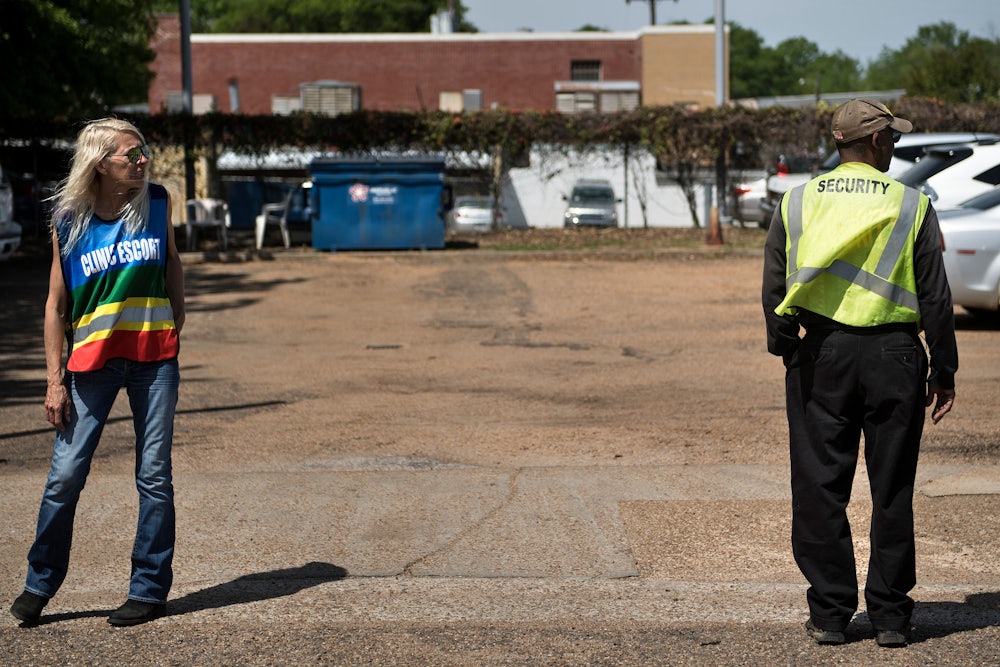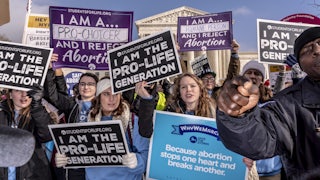On Wednesday, the Supreme Court will take up the Mississippi law that many legal experts expect eventually to overturn Roe v. Wade or at least make it obsolete. The case, Dobbs v. Jackson Women’s Health Organization, addresses a Mississippi law that prohibits abortion 15 weeks after “the first day of the last menstrual period,” an interval during which many people would not yet realize they were pregnant at all. Mainstream medical experts tend to measure “fetal viability”—the point at which a fetus can survive outside the womb—around 25 weeks. The case before the court now asks them to decide “whether all pre-viability prohibitions on elective abortions are unconstitutional.” Nancy Northup, who leads the organization spearheading the fight against the law, told ABC, summing up a general sentiment among abortion rights advocates, “You cannot uphold Mississippi’s 15-week ban on abortion and continue the precedent of Roe v. Wade. They’re not compatible.”
After oral arguments, the court is not expected to issue a final ruling until June. Whatever happens then, access to abortion has already been impeded by misinformation from pro-life activists and the complex regulatory and political hurdles facing clinics in many states. As Robin Marty, the head of operations at the West Alabama Women’s Center, which sees patients from Mississippi, told me: “People are already confused. Patients call, and they think abortion is already illegal.” Her clinic is still operational, and it’s taking overflow from neighboring states. Marty says she’s seeing about 40 patients a month from Mississippi and another five or 10 from Louisiana, a state with extreme anti-abortion laws with only three clinics left. Louisiana, in turn, is struggling with an influx of patients from Texas, where abortion is functionally illegal. In September, a Texas law giving private citizens the authority to sue people who “facilitate” abortions in the state was allowed to stand by the court, creating a legal loophole around Roe now being tested across the United States.
Dobbs is the culmination of the decades-long conservative project to overturn Roe, and the logical conclusion of the nomination of three Supreme Court justices by Donald Trump during his term. (During his 2016 campaign, Trump said that if he had the opportunity to seat justices, the law would “automatically” be overruled.) It’s also the latest development in a lengthy, slow-motion process that chips away at abortion access in ways that can be difficult for even the generally abortion-friendly population of the U.S. to follow, which is by design.
The last few years have seen numerous state-level abortion laws and clinic restrictions ping-pong their way through the courts. The Mississippi clinic at the center of the current challenge is the only one left in the state, since the field has been plagued by intimidation from anti-abortion activists and increasingly restrictive laws, along with enormous operating costs. Activists describe an endless battle to make each legal fight a national cause. Many more of these challenges will come should Roe be overturned, making this case as much a beginning as an end: According to an analysis by the Center for Reproductive Rights, if Roe were overturned, about half the states would move immediately to restrict abortion rights further.
In the South, where abortion access is already spotty, clinics have come up with all kinds of workarounds to address issues in their home states. A network of programs flies abortion providers, who can be difficult to train and hire, in from places like California. Not a single in-state doctor works at the clinic in Mississippi that is at heart of the Supreme Court case. At Marty’s center in Alabama, providers have found a way to provide “informed consent,” a mandatory waiting period between asking for an abortion and receiving one, through certified mail. It means out-of-state patients don’t have to pay for separate trips or find a place to stay. Looking to the oral arguments and near-certain dismantling of Roe, Marty says her clinic still has several months to prepare for what might happen next. She imagines that as abortion laws become increasingly narrow, patients will be forced out of states that won’t perform the procedure after 12 or 15 weeks. “We’ll see clinics closing and people trying to get an abortion in time,” she said, just as they did in Texas. And people will still seek abortions even if they’re illegal, she added.
The state-by-state dismantling of abortion rights can make it feel as though the practice is always on the precipice of being banned outright, which, paradoxically, sometimes mutes the effect when individual laws are upheld or dismantled. With all the attention on the fate of Roe, the already dire reality for abortion-seekers gets obscured.
“I think the thing I’m most worried about is that people don’t understand what this case might be,” said Marty. “Everyone expects abortion to be completely illegal. Anything less is not a big deal.” In her estimation, laws banning abortions in the second trimester, like Mississippi’s, have been devastating. “What we’re seeing, year after year, is that advocates send out the alarm bell, people get interested, and then resources dry up again. That’s what happens every time.” Which isn’t to say that this case before the Supreme Court isn’t historic. It’s just that it’s already been a long time since people had meaningful access to abortion in many parts of the U.S.






